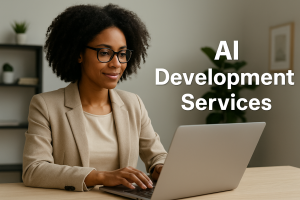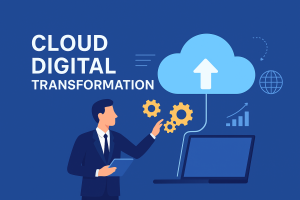The marketing world stands at the edge of a remarkable transformation. What was once driven by intuition, creativity, and experience is now powered by intelligent data and automation. Artificial Intelligence (AI) has moved from being a futuristic concept to a practical and powerful engine behind modern marketing success. Today, brands that harness AI are not just improving efficiency—they’re redefining how customers connect, engage, and stay loyal.
The Rise of AI in Digital Marketing
Artificial Intelligence has become a driving force in digital transformation across industries, but its impact on marketing is particularly profound. From predictive analytics and chatbots to automated content creation and personalized recommendations, AI is reshaping every aspect of marketing operations.
AI marketing strategies leverage machine learning, data analytics, and automation to make smarter decisions faster. Instead of guessing what customers want, marketers now use AI-driven insights to anticipate their preferences, behaviors, and buying intentions with remarkable accuracy.
The Future of marketing with AI isn’t just about technology—it’s about the intelligent collaboration between human creativity and machine precision. Together, they’re creating a marketing ecosystem that’s more efficient, personalized, and impactful than ever before.
1. Personalization at Scale
One of the most powerful benefits of AI marketing strategies is hyper-personalization. Traditional marketing could personalize to an extent, but AI enables personalization at scale—across millions of users simultaneously.
By analyzing user data such as browsing patterns, purchase history, and engagement trends, AI can predict what each customer is most likely to respond to. This allows brands to deliver tailored messages, product recommendations, and offers that resonate with individual needs in real time.
For instance, streaming platforms like Netflix or Spotify use AI to analyze your preferences and create personalized recommendations. The same concept applies to e-commerce, where AI suggests products based on previous interactions—turning browsing into buying.
2. Predictive Analytics for Smarter Decisions
AI’s predictive analytics capabilities are transforming how marketers plan campaigns. Instead of relying on past data alone, AI can forecast future trends and outcomes. This means businesses can make proactive decisions about product launches, ad placements, and customer engagement.
Predictive models can identify which customers are at risk of churn, which campaigns are likely to perform best, and what kind of content will drive the highest engagement. The result is more efficient marketing spending and higher ROI.
3. Automated Customer Interactions
AI-powered chatbots and virtual assistants are revolutionizing customer service and engagement. They provide instant responses to customer queries, streamline lead qualification, and even guide users through the purchase journey—all while maintaining a personalized tone.
What makes these AI-driven tools truly transformative is their ability to learn and adapt. Over time, they become smarter, understanding user intent and context better, which enhances overall customer satisfaction.
4. Smarter Content Creation and Optimization
AI doesn’t just analyze data—it creates too. From generating email subject lines to writing blog introductions and even crafting social media posts, AI tools can help marketers produce content faster and more effectively.
But beyond creation, AI also optimizes content performance. Algorithms can analyze engagement metrics and suggest the best posting times, platforms, and formats. They can even recommend adjustments to tone or keywords to improve SEO performance.
AI ensures that content isn’t just produced—it’s produced with precision, aligning perfectly with audience preferences and search intent.
5. Data-Driven Advertising
Digital advertising has evolved from intuition-based placement to algorithmic precision. AI marketing strategies make ad targeting smarter, faster, and more cost-efficient.
Machine learning models analyze user behavior across platforms to identify the right audience segments and optimize bids automatically in real time. This reduces ad waste and ensures better conversions.
Programmatic advertising, driven by AI, allows marketers to reach their audiences with pinpoint accuracy. Whether it’s through Google Ads, Facebook, or LinkedIn campaigns, AI ensures every dollar spent delivers maximum impact.
6. Voice and Visual Search Optimization
The way people search online is changing. Voice-enabled devices like Alexa and Google Assistant have made conversational queries mainstream. Similarly, visual search tools such as Google Lens are redefining discovery.
AI is central to these advancements. Brands that adapt their content for voice and visual search can gain a significant advantage. Optimizing for natural language queries, adding image metadata, and improving accessibility are now essential parts of digital marketing strategy.
The future of marketing with AI will rely heavily on understanding how consumers interact beyond text—through voice, visuals, and even augmented experiences.
7. Ethical AI and Transparency
While AI opens incredible opportunities, it also raises questions about privacy, data ethics, and transparency. Consumers are becoming more conscious of how their personal data is gathered, managed, and utilized. Marketers must balance personalization with ethical responsibility.
Building trust means using AI responsibly—ensuring algorithms are transparent, unbiased, and secure. Companies that prioritize ethics in AI marketing strategies will not only comply with regulations but also build stronger relationships with their customers.
8. The Human-AI Collaboration
AI is not replacing marketers—it’s empowering them. By automating repetitive tasks like data analysis and ad optimization, AI allows human marketers to focus on creativity, storytelling, and strategy.
The real power lies in collaboration: humans bring empathy and imagination, while AI contributes precision and speed. This synergy defines the future of marketing with AI—one where data meets creativity to deliver meaningful customer experiences.
The Road Ahead
The evolution of AI in digital marketing is still unfolding. From real-time personalization to fully autonomous campaign management, the potential is limitless. As technology advances, marketers who embrace AI early will lead the next generation of digital transformation.
Organizations that integrate AI into their core marketing strategies will not only outperform competitors but also redefine customer expectations. And with trusted partners like Redtgs, businesses can seamlessly leverage AI to enhance marketing performance, drive innovation, and achieve sustainable growth.
Frequently Asked Questions (FAQ)
1. What are AI marketing strategies?
AI marketing strategies use artificial intelligence technologies—like machine learning, natural language processing, and predictive analytics—to automate marketing tasks, analyze consumer behavior, and deliver personalized customer experiences.
2. How does AI improve digital marketing?
AI enhances digital marketing by providing deeper data insights, enabling real-time personalization, optimizing advertising, and automating repetitive processes. This results in more efficient campaigns and improved customer engagement.
3. Is AI replacing human marketers?
No. AI complements human marketers by handling data-driven and repetitive tasks. Humans still play a vital role in creativity, storytelling, and emotional connection—areas where AI cannot replace intuition or imagination.
4. What is the future of marketing with AI?
The future of marketing with AI involves greater automation, hyper-personalized content, advanced predictive analytics, and ethical AI use. Marketers will focus more on creativity while AI manages data and execution.
5. How can businesses start implementing AI in their marketing?
Businesses can begin by integrating AI tools for analytics, customer engagement, and content optimization. Partnering with technology experts helps ensure smooth adoption and maximum value from AI investments.






